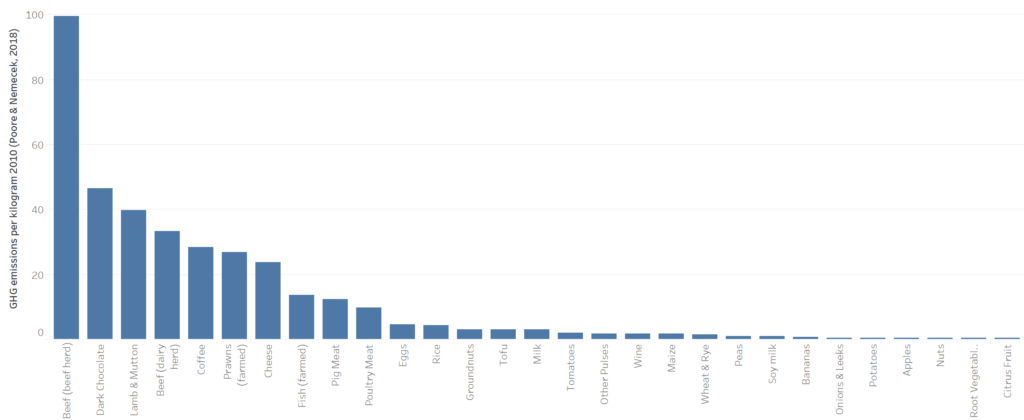There are many things that can impact a person’s, and a community’s, impact upon the environment. Some things we might be able to stop doing. That is not the case with eating food. We have a large number of people on the planet and we all have to eat. As such, an important question is what are the environmental impacts of foods? The message is that there is a lot of difference in the impact that we create. This depends upon what we eat and, even given that, how the food is created and sold.
Studying Environmental Impacts
Poore and Nemecek produced a large-scale study looking at the impact of various types of food. This is critical as they tell us that 87% of agricultural land produces food, (as opposed to biofuels, textiles etc..)
I have no special knowledge in this area. Given this, I am largely leaning on peer review and the fact their work was published in Science. I can also say there are obvious positive signs of quality, e.g., the authors attempted to weight the findings from different parts of the globe. Overall, the work does seem well-detailed and a useful way to look at things. One can even get the data on the excellent ‘Our World in Data’ website, see here. (As an aside, I highly recommend Our World in Data. This is a great example of how data can be presented in ways that help improve our knowledge of the world that we live in).
Variability Across Food Types
What do Poore and Nemecek uncover about the environmental impacts of foods? A major finding is that what you eat greatly affects the environmental impact your food creates. In essence, animal-based food, e.g., meat and dairy, generally have a much greater impact on the environment than plant-based alternatives.
Most strikingly, impacts of the lowest-impact animal products typically exceed those of vegetable subsitites, providing new evidence for the importance of dietary change.
Poore and Nemecek, 2018, page 987

This helps explain the rise of the flexitarian. This is a person who eats meat (unlike a vegetarian) and so presumably doesn’t have a strong ethical objection on animal welfare grounds. Yet, they choose to eat less meat to reduce their environmental impact.
The study of food impacts can be seen as very positive. People often bemoan the number of people on the planet. (I am not a fan of such thinking to be honest, see here). Still, it is a valid point that if everyone we have on the planet lived like a North American, or even a European, the planet couldn’t support us. The good news is that it is quite possible to change things so North Americans make less of a negative environmental impact all while eating well. This doesn’t require any unimaginable innovation, it is very achievable.
Variability Within Food Types
One challenge is that even within food types there is considerable variability. Thus, while choosing the right products helps, that isn’t really enough. You want to choose the right products produced in less negatively environmentally impactful ways. Here labeling can help. If the impact of a food type varies and labels tell us this, the consumer can reward those making less destructive products.
The authors also note how important food waste is in the supply chain. Emissions from wasted products can easily exceed the emissions from retail systems. This means it isn’t enough to cut down on the packaging. Cutting packaging won’t do as much as we want it to if the food we packaged responsibly is just thrown away.
For products such as beef, distribution and retail losses contribute 12 to 15% of emissions.., whereas the sum of emissions from packaging, transport, and retail contributes just 1 to 9%.
Poore and Nemecek, 2018, page 990
Again, there is a positive spin to be had. (Of course, this doesn’t mean we will do it, but we could). Cutting down on waste will be good for firms’ bottom lines and good for the planet.
For more on sustainability see here, here, here, here, and here.
Read: J. Poore and T. Nemecek (2018) Reducing food’s environmental impacts through producers and consumers, Science, 360, pages 987-992
